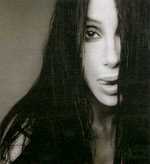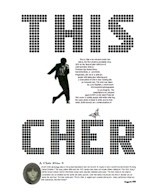As I started working on this post last Friday, I wasn't sure which blog it would end up in (the Cher blog or the poetry blog). I feel the topic is halfway between writing the great American story/novel/movie/song/poem and the Cher blog where I could start to talk about Cher’s major career themes. I decided on the later since I’m starting to work on a Cher book divided by categories which are much more generalized and less specific than the Great American Themes but that are worth looking at through the kaleidoscope that is Cher.
To date I’ve finished reading 61 books on pop culture topics. Which is nothing, by the way, a drop in the bucket in the proliferation of pop culture scholarship these days. Academic Pop Culture Studies have exploded in the last 30 years, ever since “the Madonna essay.” We can get degrees in this now? Indeed. Not when I was a kid.
But pop culture pontificating has basically borrowed the existing think-tanking apparatus from the study of literature, which I did get a degree in so… yes ma, my indulgent book-club degree may just be of use here.
Here is a small sampling of the Cher-book categories to give you a taste of what the book will cover:
- Feminism
- Women on TV in the 1970s
- Cher as Drag
- High vs. Lowbrow Culture
- Camp Culture
- Appeal as Gay Icon
- Movies & TV
- The Male Gaze, MTV and the Female Gaze Looking Back
- Power Pop/Girl Music
- The Diva/Icon/Unruly Woman
- Fan Culture
As of now there are 17 major categories. From the beginning I realized my weak spot would be writing about music, a category I don’t feel particularly knowledgeable about or good at writing about; so two years ago I started reading books around that, which led to a few minor obsessions: a search for Lester Bangs' essays, Lester Bangs' reviews of Sonny & Cher, and women writing about rock music.
It also lead to three rock histories, Good Booty by Ann Powers (a history of popular American music through the lens of sex), How the Beatles Destroyed Rock and Roll by Elijah Wald (worst click-bait title of a book I’ve ever seen…but nonetheless good alternative history of American popular music from a perspective of changing technology) and finally Mystery Train, Images of America in Rock and Roll Music by Greil Marcus. I was dissatisfied with the last book, only because the notes take up half the book and the meat of the thing only covers about five American themes:
- Stagger Lee and the myth of the African American man as gangster
- Everyman and freedom in the songs of Randy Newman
- Pilgrims like The Band
- Rags to riches and the country glamour of Elvis
But the book title does say "images" and not "themes" so my bad there. Anyway, this all got me to thinking about my own bigger list of the Great American Themes. And while I was wide awake last Thursday night it occurred to me most of the big themes are all oddly covered in the 1971 The Partridge Family Album.
 Before I launch into these themes and TPF Album, I want to say a few things:
Before I launch into these themes and TPF Album, I want to say a few things:
- This was not my Partridge Family album. This was one of my brother’s albums. This thing came out in 1971 when I was 1 year old. Today both of my brothers refuse to cop to owning this thing but I am a witness to the fact that it was worn out by the time I got to it sometime in 1975. The cover was falling apart and the vinyl was worn and scratched already (and not by my parents, to be sure). Maybe it was neighbor kid Leewee's album (yes, that was his real name and we tend to blame him for things in situations like this). In any case, this was the first non-Sonny & Cher/Sesame Street/Mr. Rogers/Disney Storyteller album I listened to.
 For years I’ve been confused about why I still like it and looking at the back cover again today on the Googles, I can see why: it was essentially a Wrecking Crew album. The initial Partridge Family “sound” (and I would add, the initial very creepy sound) was based on the Ron Hicklin Singers and The Love Generation. But when everyone learned David Cassidy could sing, he was promoted to singer…for many obvious reasons. The album's non-Cassidy songs reflect the sickly-sweet foundational sound.
For years I’ve been confused about why I still like it and looking at the back cover again today on the Googles, I can see why: it was essentially a Wrecking Crew album. The initial Partridge Family “sound” (and I would add, the initial very creepy sound) was based on the Ron Hicklin Singers and The Love Generation. But when everyone learned David Cassidy could sing, he was promoted to singer…for many obvious reasons. The album's non-Cassidy songs reflect the sickly-sweet foundational sound.
- I was too young to be a fan of David Cassidy. He was old hat by the time later-day Gen X girls were crushing on singers and so Sean Cassidy was much preferred as was Kristy McNichol's brother Jimmy, which girls were losing their minds over as I recall. I've also never seen a single episode of The Partridge Family. It wasn't syndicated in St. Louis by the time I was watching copious hours of after-school TV. And these days, I can't look at that patchwork bus for very long before I start to get a headache.
So anyway, back to the themes. I made a table:
|
Theme |
Partridge Family Album Song That Applies |
Other Literature That Applies |
|---|---|---|
|
The great American shoot-out, guns |
Any western or gangster film |
|
|
Reinvention, self-help |
Great Gatsby |
|
|
Upward mobility, rags to riches, class |
"Bandela" |
To Kill a Mockingbird |
|
The party, altered states, bottoming out |
"Point Me in the Direction of Albuquerque" |
Infinite Jest |
|
Nostalgia, the passage of time, the party’s over, loss of innocence |
Blood Meridian |
|
|
Driving, cars, wheels and rivers |
The Adventures of Huckleberry Finn |
|
|
The religious, spiritual quest, cults |
Moby Dick |
|
|
Self-actualization, identity (may not necessarily include a reinvention), general Me-ness |
Invisible Man |
|
|
Pragmatism |
Pragmatism by William James, anything by Ben Franklin |
|
|
Survival of the fittest, The American Dream |
The Grapes of Wrath, |
Anyway, the Cher-text does not cover many of these American themes, at least not in song lyrics. Reinvention (and its root-cause of failure) is certainly a career theme, as is alienation, social mobility, and nostalgia (through remediation of old material). The shoot-out cowboy does make an appearance (via Sonny’s songwriting) as does coming-of-age and the loss of innocence (in both Sonny’s cowboy and teen pregnancy songs) and Cher does have a few songs about traveling on airplanes.
More to think about there.



Thought you might like to read
https://www.stereogum.com/2191750/the-number-ones-chers-believe/columns/the-number-ones/